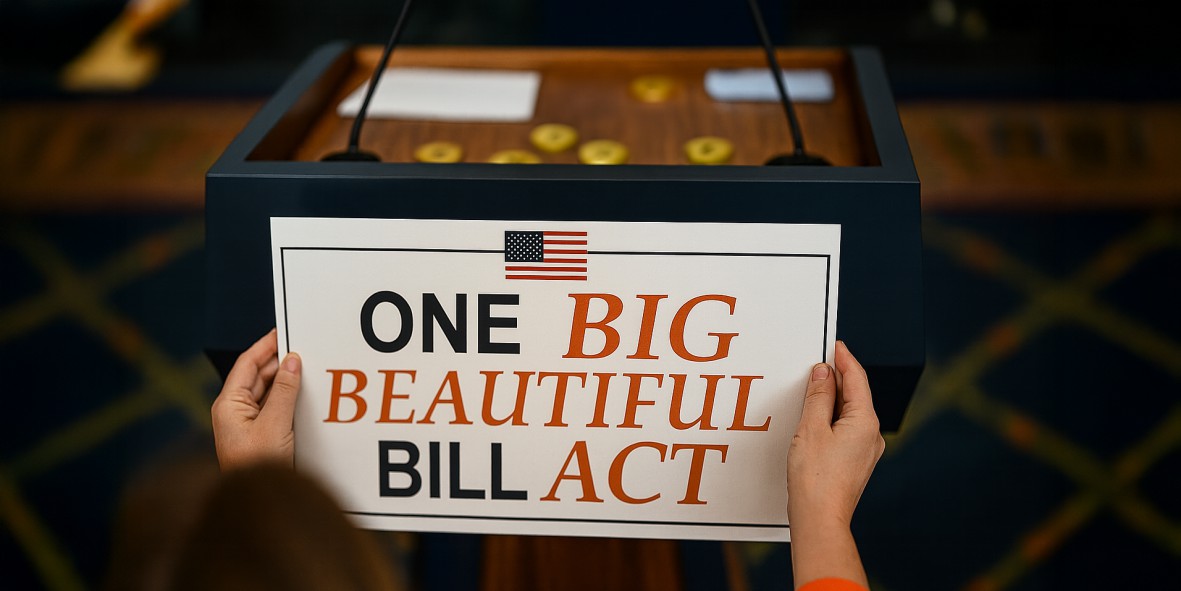4 Key Takeaways:
- Tax Cuts Made Permanent, Social Programs Tightened
The bill makes Trump-era tax relief permanent and imposes stricter work requirements for Medicaid and food assistance. - Green Energy Scaled Back, Fossil Fuel Expansion Approved
Incentives for clean energy are scrapped, while oil and gas projects get easier access, lower fees, and faster approvals. - AI Oversight Centralized, Tech Systems Set for Upgrade
States won’t be allowed to regulate AI for the next decade, and the federal government is investing in AI-powered systems to modernize its tech infrastructure. - Crypto Tax Fixes Left Out—for Now
Proposals to ease crypto tax rules were cut from the bill, but shifts in inflation, energy, and tech policy could still work in the industry’s favor.
The U.S. Senate passed Trump’s “One Big Beautiful Bill” on Tuesday in a 51 to 50 vote, with Vice President J.D. Vance casting the tie-breaking vote.
The Republican-backed bill, which proposes tax cuts and Medicaid changes, expanded border enforcement, and energy deregulation, now heads back to the House for a final vote on Senate revisions. If passed, it will go to President Donald Trump for his signature.
The approved version followed weeks of intense closed-door negotiations, as Republican leaders worked to navigate budget rules and address concerns from moderate senators. Several last-minute changes were made to secure enough votes, including stricter Medicaid work requirements and a revised cap on state and local tax deductions.
House leaders aim to hold a vote before the July 4 recess. If enacted, the bill would represent one of the most significant Republican policy moves since the 2017 tax cuts, with broad implications for the federal government’s role in economic, social, and energy policy.
Big Cuts, Big Changes: What The Bill Does and Why It Matters
The bill permanently extends individual tax rate reductions introduced under the 2017 Trump tax law. It adds new deductions for tip income, overtime, and vehicle interest, and creates federally funded savings accounts for children born between 2025 and 2029.
The legislation imposes stricter work requirements for recipients of Medicaid, the federal health insurance program for low-income Americans, and SNAP, the Supplemental Nutrition Assistance Program. It also shifts more responsibility for managing these programs to individual states and eliminates several current exemptions.
Additionally, the bill rewrites federal student aid, eliminating subsidized loans and graduate PLUS loans. Borrowers will be limited to a fixed repayment plan or a streamlined income-based model.
Dozens of climate programs and clean energy subsidies established under the Inflation Reduction Act are repealed. The bill directs increased fossil fuel leasing on federal lands, lowers royalty rates, and relaxes environmental permitting under the National Environmental Policy Act.
The bill significantly increases funding for defense and border security, including more staffing for ICE and Border Patrol, new construction of border infrastructure, and investments in military modernization such as AI systems, missile defense, and Indo-Pacific operations.
It also tightens eligibility rules across federal programs, prioritizing citizenship and work history. Immigration processing fees are raised, and states that provide benefits to undocumented residents could face cuts in federal funding.
Ten-Year Shield for AI: Bill Blocks State Oversight, Funds Federal Modernization
The bill prevents states and local governments from regulating artificial intelligence systems for the next ten years, giving the federal government sole authority over how AI technologies are governed, with exceptions for state measures that help ease adoption or avoid imposing new requirements beyond those already covered by federal law.
The bill also directs new funding to the Department of Commerce to upgrade federal IT infrastructure. The agency is tasked with replacing legacy systems, expanding the use of commercial AI tools to improve public services, and strengthening cybersecurity with modern, automated defenses.
What the ‘Big Beautiful Bill’ Means for Crypto
Even though the bill doesn’t mention cryptocurrency or blockchain directly, and industry advocates’ requests for tax clarity were left out, its broader policy shifts are drawing close attention from the digital asset sector.
Rising inflation risks, energy deregulation, and new federal moves on tech oversight could create favorable conditions for parts of the crypto market.
Crypto Tax Relief Proposals Dropped ..For Now?
Senator Cynthia Lummis had pushed for several crypto-friendly measures early on, including making small crypto transactions under $300 tax-free and ensuring staking rewards are taxed only when sold.
However, those proposals didn’t make it into the approved final version.
“We ran out of time to include the crypto tax title in the Big Beautiful Bill,” said Alexander Grieve, vice president of government affairs at Paradigm, in a post on X Tuesday, hinting that the effort isn’t over and they plan to keep pushing until it’s passed.
Inflation Expectations May Reignite Bitcoin’s Hedge Narrative
The Congressional Budget Office estimates the bill could add between $2 trillion and $2.5 trillion to the national debt over the next ten years.
That level of government spending has raised concerns about long-term inflation, which some analysts say could boost demand for Bitcoin and other digital assets seen as hedges against rising prices.
Energy Policy Changes Could Shift Mining Economics
The bill scraps many of the clean energy incentives from the Inflation Reduction Act, including support for electric vehicles, renewable power, and energy-efficient homes. Instead, it shifts focus toward fossil fuel production by making it easier to lease federal land, lowering royalty fees, and speeding up approval for oil and gas projects.
Crypto miners may benefit from reduced environmental scrutiny and lower energy costs, particularly in states with abundant fossil energy resources.
In Conclusion
The “Big Beautiful Bill” may not mention crypto directly, but its sweeping impact on tax policy, government spending, energy markets, and tech oversight has put the digital asset sector on high alert. While crypto advocates were disappointed by the exclusion of tax reforms for small transactions and staking, many see this as a temporary setback in a longer legislative push.
At the same time, the bill’s broader economic and regulatory shifts, particularly its inflationary outlook, fossil-fuel tilt, and centralized approach to emerging technologies, could indirectly benefit crypto markets.
For the time being, the crypto community is watching closely to see how the bill’s broader economic and regulatory shifts play out, and whether lawmakers will renew efforts to push through long-sought tax reforms in upcoming legislation.
Read More: Botanix Launches First Decentralized Bitcoin L2: 5-Second Blocks, EVM Compatibility







